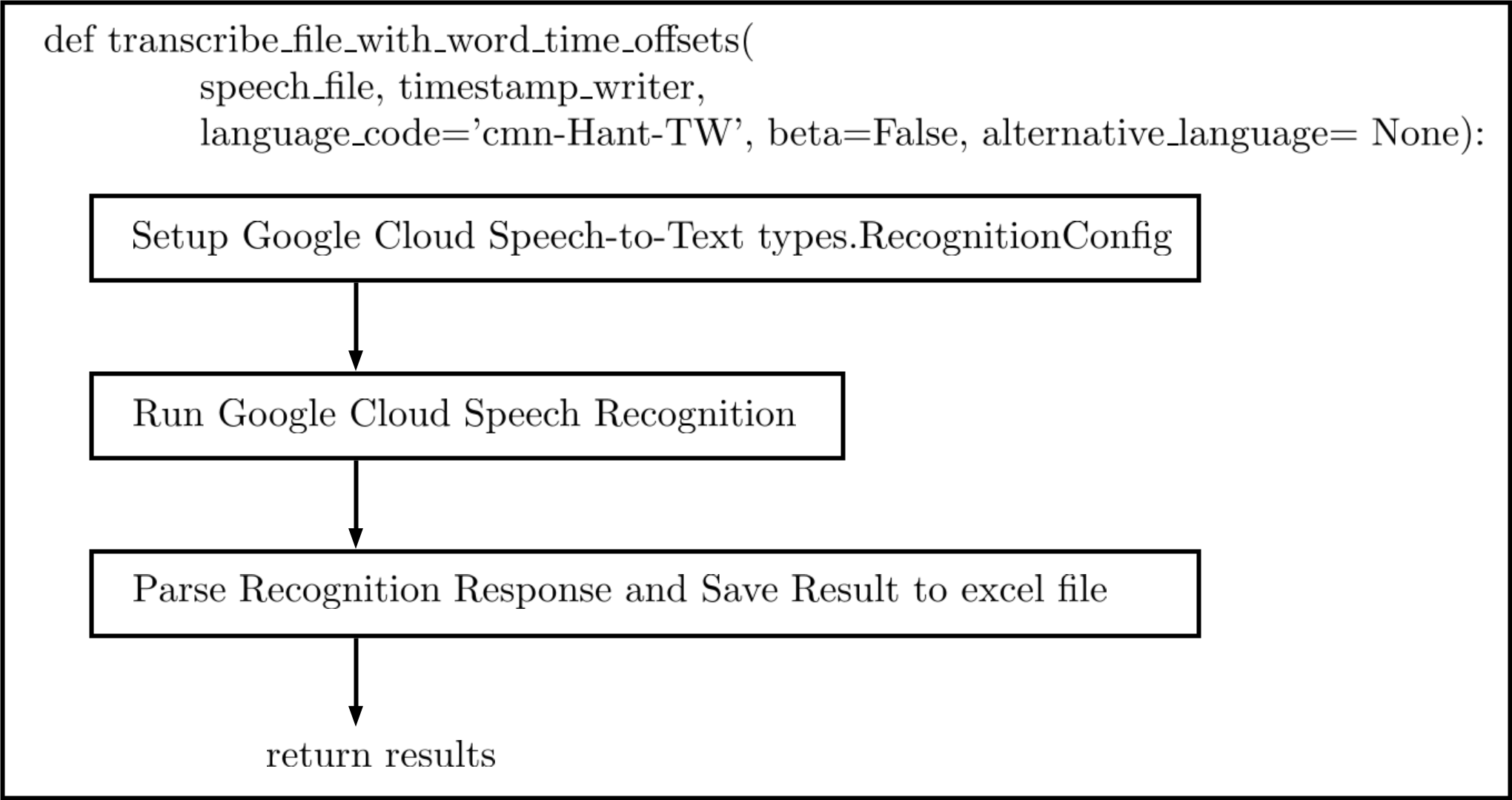function transcribe_file_with_word_time_offsets()
 Fig.1 Flowchart of function
Fig.1 Flowchart of function transcribe_file_with_word_time_offsets
Fig.1呈現函數transcribe_file_with_word_time_offsets的流程圖。
函數transcribe_file_with_word_time_offsets的輸入參數包含
speech_file音頻的檔名timstamp_writerxlsx的檔名language_code轉譯的語言betagoogle cloud api beta版?alternative_language替代語言(沒有使用)
函數transcribe_file_with_word_time_offsets有三大程式區塊
- Setup Google Cloud Speech-to-Text types.RecognitionConfig
- Run Google Cloud Speech Recognition
- Parse Recognition Response and Save Result to excel file
函數transcribe_file_with_word_time_offsets把文件轉譯結果存進results變數裡輸出,在transcribe_file_with_word_time_offset.py裡,是返回函數batch_transcribe_speechFile (行143)。
045 def transcribe_file_with_word_time_offsets(speech_file, timestamp_writer, language_code='cmn-Hant-TW', beta=False, alternative_language= None):
046 """Transcribe the given audio file synchronously and output the word time
047 offsets."""
048 samp_freq, _ = wavfile.read(speech_file)
049 if beta:
050 from google.cloud import speech_v1p1beta1 as speech
051 from google.cloud.speech_v1p1beta1 import enums
052 from google.cloud.speech_v1p1beta1 import types
053
054 config = types.RecognitionConfig(
055 encoding=enums.RecognitionConfig.AudioEncoding.LINEAR16,
056 sample_rate_hertz=samp_freq,
057 language_code=language_code,
058 #alternative_language_codes=['en-US'],
059 alternative_language_codes = alternative_language,
060 enable_word_time_offsets=True,
061 speech_contexts=[types.SpeechContext(
062 phrases=['四', '三', '二', '一'],
063 )],
064 enable_word_confidence=True
065 )
066
067 else:
068 from google.cloud import speech
069 from google.cloud.speech import enums
070 from google.cloud.speech import types
071
072 config = types.RecognitionConfig(
073 encoding=enums.RecognitionConfig.AudioEncoding.LINEAR16,
074 sample_rate_hertz=samp_freq,
075 language_code=language_code,
076 enable_word_time_offsets=True,
077 speech_contexts=[types.SpeechContext(
078 phrases=['四', '三', '二', '一'],
079 )],
080 #enable_word_confidence=True
081 )
082
083 client = speech.SpeechClient()
084
085 with io.open(speech_file, 'rb') as audio_file:
086 content = audio_file.read()
087
088 audio = types.RecognitionAudio(content=content)
089
090 response = client.recognize(config, audio)
091
092 _, filename = parse_filepath(speech_file)
093 n = re.match(r'C(.+)\.wav', filename)
094 audio_index = n.group(1)
095 results = []
096 for i, result in enumerate(response.results):
097 alternative = result.alternatives[0]
098 print(u'Transcript {}_{}: {}'.format(audio_index, i+1, alternative.transcript))
099 results.append(alternative.transcript)
100
101 word_index = []
102 start_time_column = []
103 end_time_column = []
104 confidences_list = []
105 for word_info in alternative.words:
106 word = word_info.word
107 start_time = word_info.start_time
108 end_time = word_info.end_time
109 word_index.append(word)
110 start_time_column.append(start_time.seconds + start_time.nanos * 1e-9)
111 end_time_column.append(end_time.seconds + end_time.nanos * 1e-9)
112 if hasattr(word_info, 'confidence'):
113 confidences_list.append(word_info.confidence)
114 else:
115 confidences_list.append(float('nan'))
116
117 df = pd.DataFrame({'start_time':start_time_column, 'end_time':end_time_column, 'confidence':confidences_list}, index=word_index)
118 #print(df)
119 df.index.name = 'word'
120 df.to_excel(timestamp_writer,'{}_{}'.format(filename, i+1))
121
122 return results